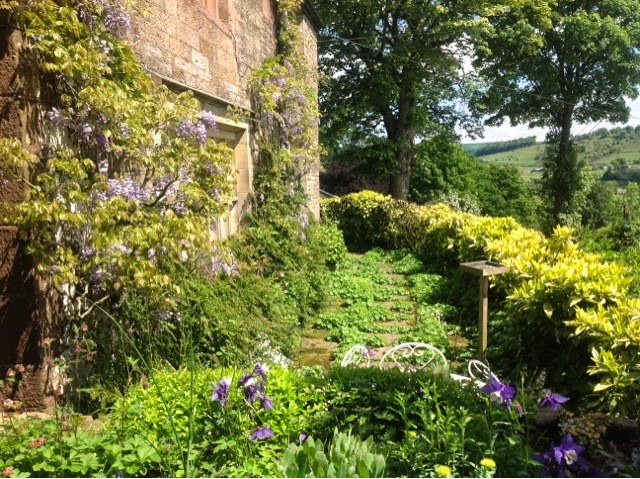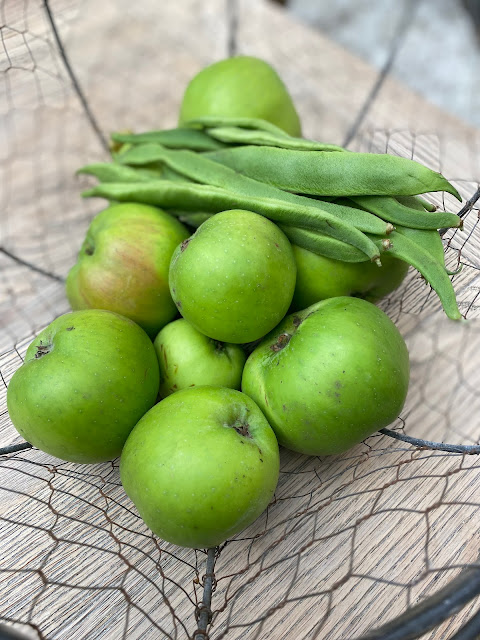Through the Seasons
'Our lives today are governed by the endless ticking of the clock. The ancients talked of the Wheel of Time, the constant circle of birth and rebirth. We choose a totally different metaphor: for us, life is a constantly flowing stream. In our mind's eye time marches or flies, it never stands still and it never recedes. This linear view of time makes us hurried and impatient, and is the root cause of the hurry sickness which has become such a destructive feature of our modern lives.'

...while with late summer comes a faded grandeur before Autumn brings a new elegance ahead of the untidiness of November....
A
nd so the wheel of the seasons turns, each bringing its own pleasures which we should strive to find the time to appreciate. A garden is for living in, not just working in.
This passage has been taken from 'The Therapeutic Garden' (Donald Norfolk, Bantam Books, 2000) and quoted in 'The Art of Mindful Gardening' (Ark Redwood, Leaping Hare Press). The message strikes at the heart of everything I struggle with in daily life - the constant need to be juggling and rushing, the difficulty of finding that elusive element, Time, in which to simply Be. If we are not careful we all miss the defining element of life - in other words the fact that we have been given the miracle of birth and that we are spending our living days on a living planet before we leave it again and return to the earth and the ether. So much of these precious hours and minutes that we have been given are spent rushing from one thing to the next in this Time-hungry world that we have created that it is nigh on impossible to find moments in our daily lives in which to be still, to look, to hear, to smell and to appreciate.
It is even an issue with gardeners who, arguably, should be adept at being in touch with the natural world and taking refuge from the madness without. But even here it is all too easy to be constantly finding a job to do in the garden: to be sowing, cutting, weeding, primping, pruning, digging and the like. I am always getting cross at my own mother for making her gardening too much like hard work with her need for everything to be perfect such that the garden risks becoming a burden rather than a joy, especially as age creeps up on her.
While I accept that gardening is an act of taming nature, we should always work with nature rather than against it. Don't plant plants unsuited to their climate and environment - all that does is set you up for some time-consuming over-management, expense, and, ultimately, disappointment as things fail to thrive.
I was lucky enough, I admit, to inherit a garden which was fully mature, but when you look around you see that the plants and shrubs and trees have broadly been chosen because they are suitable for our climate here. There are astilbes, loosestrife, aruncus, ferns, rhododendrons, cornus - all things which are happy in this cool, damp, upland environment. Welsh poppies and alchemilla mollis pop up in every crevice. It is a garden at ease with itself, happy to be what it is rather than trying to be something it isn't.
In winter the mature trees, conifers, evergreens and deciduous shrubs hold the shape of the garden - it's bones exposed - still offering so much naked pleasure to the mindful eye...
The snowdrops bring the first flush of life and cold colour...
....followed soon by the optimistic yellows and pinks of spring with the daffodils, forsythias and blossoms.

Next the soft scent and hues of bluebells fill the dell together with the brasher colours of the azaleas, the rhodis and the primulas while the new vegetation is bright and fulsome...
From the brilliance of May and early June we move into the blowsy maturity of July...
...while with late summer comes a faded grandeur before Autumn brings a new elegance ahead of the untidiness of November....
...and then the peace of Winter again...
A
nd so the wheel of the seasons turns, each bringing its own pleasures which we should strive to find the time to appreciate. A garden is for living in, not just working in.
'There are times in our lives for acceptance and nurture....And there are times in our garden for contemplation, rest, and dormancy'.
(Cultivating Sacred Space Gardening for the Soul, Elizabeth Murray, Pomegranate 1997).




















Comments
Post a Comment